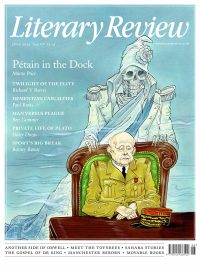Jon Talbot
Twenty-Storey Love Song
Manchester Unspun: Pop, Property and Power in the Original Modern City
By Andy Spinoza
Manchester University Press 376pp £20
One of the curious aspects of life in England is that despite the small size of the country and the advent of modern media, North and South are still largely ignorant of one another. The dramatic transformation of Manchester in the last thirty years is known by everyone in the North but not so by most in the South. For those unacquainted with the city, a few facts are necessary. Between 1972 and 1984 it lost 207,000 manufacturing jobs. Its population, once around 750,000, had shrunk to almost 400,000 by 1989. The physical fabric of the city, Victorian red brick and slate, was not just dirty and decaying but in many cases abandoned. The population of the city centre in 1982 was about five hundred. Contrast that with today: there are now sixty thousand people living in the centre, many of them housed in fifty-five shiny new buildings over twenty storeys high. The city’s profile is unlike that of any other in Britain. From a nearby Pennine hill, it is an extraordinary sight – the kind of cityscape you would expect to see in North America.
The pace of building is accelerating. There are another twenty-three high-rises under construction and a further thirty-five have planning permission. The city now is a chaotic mixture of refurbished Victoriana and concrete and glass. What should jar seems to work. The inhabitants of the towers are overwhelmingly young, graduates and extremely diverse. It is an exciting city for them and for the casual visitor. Despite national economic woes since 2008, the world’s first industrial city is transforming itself into the world’s first post-industrial city.
Andy Spinoza’s book is an attempt to explain the phenomenon from the perspective of someone who came to the city as a student in 1979 and stayed. After graduating he founded an alternative magazine, then worked for the Manchester Evening News and as a PR consultant. He has

Sign Up to our newsletter
Receive free articles, highlights from the archive, news, details of prizes, and much more.@Lit_Review
Follow Literary Review on Twitter
Twitter Feed
Margaret Atwood has become a cultural weathervane, blamed for predicting dystopia and celebrated for resisting it. Yet her ‘memoir of sorts’ reveals a more complicated, playful figure.
@sophieolive introduces us to a young Peggy.
Sophie Oliver - Ms Fixit’s Characteristics
Sophie Oliver: Ms Fixit’s Characteristics - Book of Lives: A Memoir of Sorts by Margaret Atwood
literaryreview.co.uk
For a writer so ubiquitous, George Orwell remains curiously elusive. His voice is lost, his image scarce; all that survives is the prose, and the interpretations built upon it.
@Dorianlynskey wonders what is to be done.
Dorian Lynskey - Doublethink & Doubt
Dorian Lynskey: Doublethink & Doubt - Orwell: 2+2=5 by Raoul Peck (dir); George Orwell: Life and Legacy by Robert Colls
literaryreview.co.uk
The court of Henry VIII is easy to envision thanks to Hans Holbein the Younger’s portraits: the bearded king, Anne of Cleves in red and gold, Thomas Cromwell demure in black.
Peter Marshall paints a picture of the artist himself.
Peter Marshall - Varnish & Virtue
Peter Marshall: Varnish & Virtue - Holbein: Renaissance Master by Elizabeth Goldring
literaryreview.co.uk